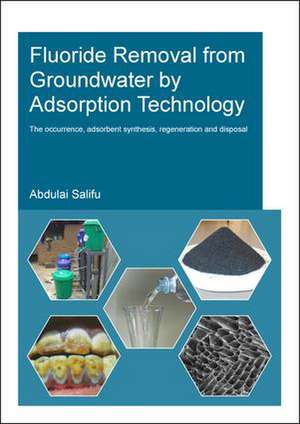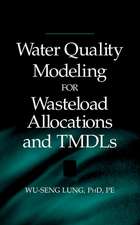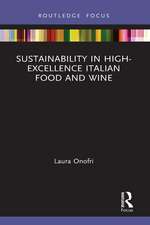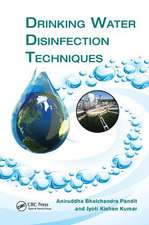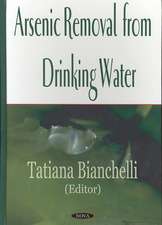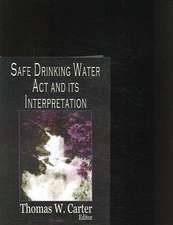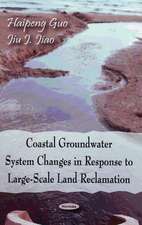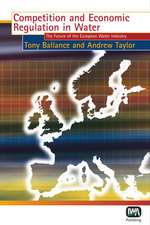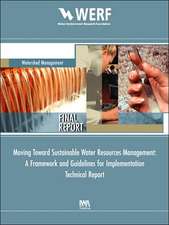Fluoride Removal from Groundwater by Adsorption Technology: IHE Delft PhD Thesis Series
Autor Abdulai Salifuen Limba Engleză Paperback – 14 noi 2017
Based on principal component analysis, and saturation indices calculations, this thesis highlights that, the predominant mechanisms controlling the fluoride enrichment probably include calcite precipitation and Na/Ca exchange processes, both of which deplete Ca from the groundwater, and promote the dissolution of fluorite. The mechanisms also include F-/OH- anion exchange processes, as well as evapotranspiration processes which concentrate the fluoride ions, hence increasing its concentration in the groundwater. Spatial mapping showed that the high fluoride groundwaters occur predominantly in the Saboba, Cheriponi and Yendi districts.
The thesis further highlights that, modifying the surface of indigenous materials by an aluminium coating process, is a very promising approach to develop a suitable fluoride adsorbent. Aluminum oxide coated media reduced fluoride in water from 5. 0 ± 0.2 mg/L to ≤ 1.5 mg/L (which is the WHO health based guideline for fluoride), in both batch and continuous flow column experiments in the laboratory. Kinetic and isotherm studies, thermodynamic calculations, as well as analytical results from Fourier Transform Infrared Spectroscopy and Raman spectroscopy, suggest the mechanism of fluoride adsorption onto aluminium oxide coated media involved both physisorption and chemisorption processes.
Field testing in a fluoritic community in Northern Ghana showed that the adsorbent is also capable of treating fluoride-contaminated groundwater in field conditions, suggesting it is a promising defluoridation adsorbent. The adsorbent also showed good regenerability potential that would allow re-use, which could make it practically and economically viable. Additional research is, however, required to further increase the fluoride adsorption capacity of developed adsorbent.
| Toate formatele și edițiile | Preț | Express |
|---|---|---|
| Paperback (1) | 491.09 lei 43-57 zile | |
| CRC Press – 14 noi 2017 | 491.09 lei 43-57 zile | |
| Hardback (1) | 931.20 lei 43-57 zile | |
| CRC Press – 27 sep 2018 | 931.20 lei 43-57 zile |
Din seria IHE Delft PhD Thesis Series
-
 Preț: 355.20 lei
Preț: 355.20 lei - 23%
 Preț: 473.10 lei
Preț: 473.10 lei - 17%
 Preț: 257.23 lei
Preț: 257.23 lei - 28%
 Preț: 492.31 lei
Preț: 492.31 lei - 23%
 Preț: 472.25 lei
Preț: 472.25 lei - 13%
 Preț: 322.51 lei
Preț: 322.51 lei - 29%
 Preț: 524.35 lei
Preț: 524.35 lei - 31%
 Preț: 295.46 lei
Preț: 295.46 lei - 22%
 Preț: 399.88 lei
Preț: 399.88 lei - 30%
 Preț: 1015.76 lei
Preț: 1015.76 lei - 17%
 Preț: 268.83 lei
Preț: 268.83 lei - 44%
 Preț: 256.76 lei
Preț: 256.76 lei - 18%
 Preț: 254.47 lei
Preț: 254.47 lei - 25%
 Preț: 339.78 lei
Preț: 339.78 lei - 13%
 Preț: 322.01 lei
Preț: 322.01 lei - 26%
 Preț: 455.79 lei
Preț: 455.79 lei - 22%
 Preț: 399.48 lei
Preț: 399.48 lei - 27%
 Preț: 427.41 lei
Preț: 427.41 lei - 22%
 Preț: 371.52 lei
Preț: 371.52 lei - 26%
 Preț: 373.21 lei
Preț: 373.21 lei - 22%
 Preț: 328.64 lei
Preț: 328.64 lei - 13%
 Preț: 348.86 lei
Preț: 348.86 lei - 22%
 Preț: 369.82 lei
Preț: 369.82 lei - 18%
 Preț: 174.31 lei
Preț: 174.31 lei - 22%
 Preț: 414.78 lei
Preț: 414.78 lei - 23%
 Preț: 454.94 lei
Preț: 454.94 lei - 23%
 Preț: 315.45 lei
Preț: 315.45 lei - 17%
 Preț: 257.23 lei
Preț: 257.23 lei - 13%
 Preț: 296.68 lei
Preț: 296.68 lei - 22%
 Preț: 353.39 lei
Preț: 353.39 lei - 23%
 Preț: 326.95 lei
Preț: 326.95 lei - 13%
 Preț: 348.40 lei
Preț: 348.40 lei - 23%
 Preț: 367.30 lei
Preț: 367.30 lei - 22%
 Preț: 322.47 lei
Preț: 322.47 lei - 27%
 Preț: 425.74 lei
Preț: 425.74 lei - 17%
 Preț: 212.40 lei
Preț: 212.40 lei - 23%
 Preț: 473.94 lei
Preț: 473.94 lei - 13%
 Preț: 322.98 lei
Preț: 322.98 lei - 23%
 Preț: 367.73 lei
Preț: 367.73 lei - 22%
 Preț: 328.22 lei
Preț: 328.22 lei - 23%
 Preț: 350.43 lei
Preț: 350.43 lei - 25%
 Preț: 472.25 lei
Preț: 472.25 lei - 28%
 Preț: 498.58 lei
Preț: 498.58 lei - 23%
 Preț: 349.16 lei
Preț: 349.16 lei - 18%
 Preț: 162.13 lei
Preț: 162.13 lei - 13%
 Preț: 350.29 lei
Preț: 350.29 lei - 28%
 Preț: 550.16 lei
Preț: 550.16 lei - 25%
 Preț: 552.62 lei
Preț: 552.62 lei - 23%
 Preț: 384.59 lei
Preț: 384.59 lei - 18%
 Preț: 175.64 lei
Preț: 175.64 lei
Preț: 491.09 lei
Preț vechi: 683.87 lei
-28% Nou
Puncte Express: 737
Preț estimativ în valută:
93.97€ • 98.38$ • 77.75£
93.97€ • 98.38$ • 77.75£
Carte tipărită la comandă
Livrare economică 07-21 aprilie
Preluare comenzi: 021 569.72.76
Specificații
ISBN-13: 9780815392071
ISBN-10: 0815392079
Pagini: 300
Dimensiuni: 170 x 240 x 18 mm
Greutate: 0.75 kg
Ediția:1
Editura: CRC Press
Colecția CRC Press
Seria IHE Delft PhD Thesis Series
ISBN-10: 0815392079
Pagini: 300
Dimensiuni: 170 x 240 x 18 mm
Greutate: 0.75 kg
Ediția:1
Editura: CRC Press
Colecția CRC Press
Seria IHE Delft PhD Thesis Series
Public țintă
PostgraduateCuprins
1 General introduction
2 Factors and mechanisms controlling the occurrence of high fluoride concentration in groundwater in parts of the Northern region of Ghana
3 Dynamic behaviour of fluoride adsorption onto aluminium (hydr)oxide coated pumice: laboratory-scale column studies, modelling, mechanism and adsorbent regeneration
4 Treatment of fluoride-contaminated groundwater using granular aluminium-coated bauxite
5 Aluminol (Al-OH) functionalized wood charcoal for treatment of fluoride-contaminated groundwater: Effect of wood source, particle size, surface acidity-basicity and field assessment
6 General conclusions, perspective, limitations and recommendations.
2 Factors and mechanisms controlling the occurrence of high fluoride concentration in groundwater in parts of the Northern region of Ghana
3 Dynamic behaviour of fluoride adsorption onto aluminium (hydr)oxide coated pumice: laboratory-scale column studies, modelling, mechanism and adsorbent regeneration
4 Treatment of fluoride-contaminated groundwater using granular aluminium-coated bauxite
5 Aluminol (Al-OH) functionalized wood charcoal for treatment of fluoride-contaminated groundwater: Effect of wood source, particle size, surface acidity-basicity and field assessment
6 General conclusions, perspective, limitations and recommendations.
Descriere
High fluoride concentration in groundwater has made many drilled boreholes unusable for drinking in parts of Northern region of Ghana. Treatment of the groundwater by adsorption is also hampered by the lack of suitable locally available adsorbents. This thesis highlights through principal component analysis and saturation indices calculations that predominant mechanisms controlling the fluoride enrichment probably include calcite precipitation and Na/Ca exchange processes, which deplete Ca from the groundwater, and promote the dissolution of fluorite. Additionally, aluminium oxide coated media is capable of reducing fluoride in water, suggesting it is a promising defluoridation adsorbent.
